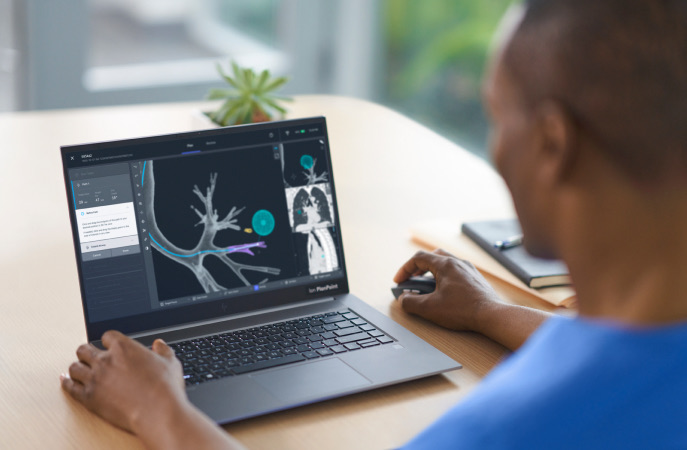About Ion by Intuitive
The Ion endoluminal* system gives doctors a nonsurgical way to biopsy lung nodules. With Ion, your doctor uses your lung’s airways to travel to a lung nodule found on a chest X-ray, CT scan, or MRI.
Ion’s unique design allows your doctor to navigate the lung airways’ tiny bends and curves. From deep in your lung to its far edges, your doctor can biopsy nodules less than a centimeter wide.1,2 For reference, that’s about the size of a pea. The ability to sample small nodules throughout the lung may help doctors diagnose lung cancer at an early stage.

Your biopsy begins with a plan
Your lungs fill with air through a complex structure of airways that get smaller as they branch out from your trachea (windpipe). Ion’s special planning software creates a detailed 3D airway map from your CT scan. The map shows possible paths to reach the nodule. Your doctor chooses a path and uploads the plan to the Ion system.

Your Ion procedure
In conventional bronchoscope biopsies, doctors manually move thicker catheters while viewing images on a screen. With Ion, your doctor steers an ultrathin tube (catheter) to the nodule. The preplanned map provides GPS-like navigation, giving your doctor turn-by-turn directions.
Ion’s navigation system and a lighted vision probe show what’s ahead, allowing your doctor to guide the catheter to its destination. Ion also uses shape sensing, a novel technology that measures the catheter’s full shape hundreds of times per second.3 With shape sensing, Ion provides the precision and stability needed to reach and biopsy small nodules all the way out to the edges of the lungs.4
Once the catheter reaches the nodule, Ion’s flexible, steerable tip lets your doctor collect multiple samples from different angles. We call this cloud biopsy.5 Collecting multiple samples from different areas of the lung nodule helps get the best results, especially in identifying lung cancer. It may also help enable biomarker testing.
Biopsies with the Ion system require general anesthesia and are usually performed as an outpatient procedure. An outpatient procedure means you’ll go home the same day.
* Endoluminal is a word doctors use to describe the area inside a tube within the body, like a blood vessel or lung airway.

Reach
Ion’s ultrathin, ultramaneuverable catheter allows clinicians to reach small nodules in all 18 segments of the lung.4
Planning
Precision
We designed Ion to provide precision for accurate biopsies of lung nodules.4
Stability
Ion’s shape-sensing catheter provides stability, enabling doctors to have clinical confidence to get early answers for patients.4
Talk to your doctor
Be sure to talk to your doctor about the outcomes they deliver using the Ion system, as every physician’s experience is different. For example, ask about:
- Complication rates
- Success of reaching small nodules in difficult-to-reach locations
- How often they get a diagnosis based on the biopsy sample
In addition, you can visit what to expect to learn about the day of your lung biopsy.
Your care journey
- Kalchiem-Dekel, Or et al.,2022. Shape-Sensing Robotic-Assisted Bronchoscopy in the Diagnosis of Pulmonary Parenchymal Lesions.
- Styrvoky, Kim et al., 2022. Shape-Sensing Robotic-Assisted Bronchoscopy with Concurrent use of Radial Endobronchial Ultrasound and Cone Beam Computed Tomography in the Evaluation of Pulmonary Lesions.
- Results based on internal testing. Data on file at Intuitive.
- Precision is the ability to place a biopsy tool in the desired location consistently. Flexibility is the ability to articulate 180° in all directions. Reach is defined by airway generation access. Stability is enabled by fiber optic sensing technology which maintains active robotic control of catheter position and corrects unwanted tip deflection. Results based on internal testing.
- Cloud biopsy is Intuitive’s terminology for describing Ion’s ability to enable users to systematically perform biopsy attempts and redirect subsequent biopsy attempts into a target area if real-time confirmation of a representative tissue sample is available during a procedure.